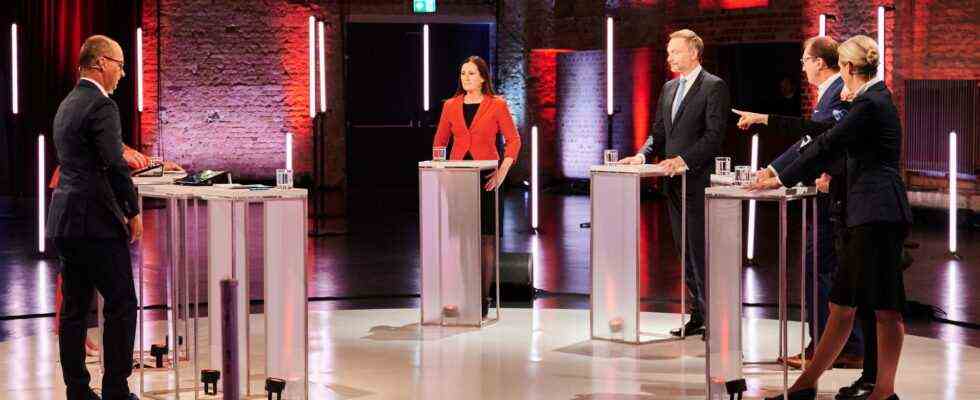Status: 13.09.2021 11:04 p.m.
It was a heated debate with many insurmountable contradictions: In the ARDBroadcast “The four-way fight after the Triell”, the top candidates from the FDP, Left, AfD and CSU argued about pensions, taxes and climate protection.
After the triumph of the Chancellor candidates, the top candidates of the four smaller parties, the FDP, Left, AfD and CSU, have exchanged blows on key political issues. In doing so, the ARDBroadcast “Der Vierkampf nach dem Triell” clearly shows different positions, for example in further pension policy or in foreign and security policy.
The debate showed again that participation of the left in an SPD-led federal government could be difficult. While SPD Chancellor candidate Olaf Scholz demands a clear commitment to NATO from every possible coalition partner, the Left Chairwoman Janine Wissler said: “We want to dissolve NATO and transform it into a collective security alliance.”
The AfD parliamentary group leader Alice Weidel pleaded for a “more relaxed relationship with Russia because Russia is an important geostrategic actor”. She rejected the sanctions against Russia.
Lindner wants to make the start of retirement flexible
In terms of pension policy, FDP chairman Christian Lindner called for a flexible model for the start of retirement. “We advocate individualization,” he said. From the age of 60 people should be free to decide when to retire. Lindner also advocated the FDP model of a share pension. Weidel then certified that he had “no idea” about investments. The AfD wanted a state fund to secure pensions, but it would have to include other forms of investment in addition to shares. “Otherwise you are very prone to crashes.”
The CSU top candidate Alexander Dobrindt promoted the third stage of the mother’s pension. “The maternal pension is about justice, not campaigning.” Dobrindt also advocated a “generation pension” as a fourth pillar alongside the statutory pension, the company pension and private provision. This would be saved from birth.
Wissler demands wealth tax
In tax policy, Wissler defended the left’s proposal to tax financial assets and private property. Since there is an allowance of one million euros per person, many homeowners, especially families, would not be affected at all, she said. There should be an allowance of five million euros for business assets.
Weidel objected that this could be the “death knell” for companies that were already burdened by the Corona crisis. “More redistribution won’t solve a problem,” she added. Dobrindt emphasized that it was now a matter of “generating economic dynamism”. Lindner reiterated its call for a super write-off for investments in capital goods. Measures are needed with which Germany can work its way out of the crisis after the corona pandemic, he said.
Weidel thinks the supply of green electricity is ridiculous
The compatibility of climate protection and industrial production was also discussed. Germany must be a role model and technology world champion in international comparison, demanded Lindner. “We have to use all technological possibilities in our country, we are a nation of engineers and technicians.” Nevertheless, Germany should remain open to energy imports. Dobrindt also sees the chance of climate neutrality by 2030 only in technological progress. “We will not become climate-neutral with existing forms of energy”.
Wissler emphasized that climate protection could only go hand in hand with a socio-ecological restructuring. For example, the traffic turnaround should not be implemented with carbon pricing, but with an expansion of local transport and rail. “What about the caregiver who lives in rural areas and has to work shifts? As long as they have no bus or train, they will get into the car, no matter how expensive the gasoline price is,” said Wissler.
Weidel warned of bottlenecks in the supply of green electricity. “No industrialized country can be operated with fluttering electricity in any way”. In an international comparison, Germany is doing badly. “Other countries laugh at us. Everyone laughs at us,” said Weidel.

